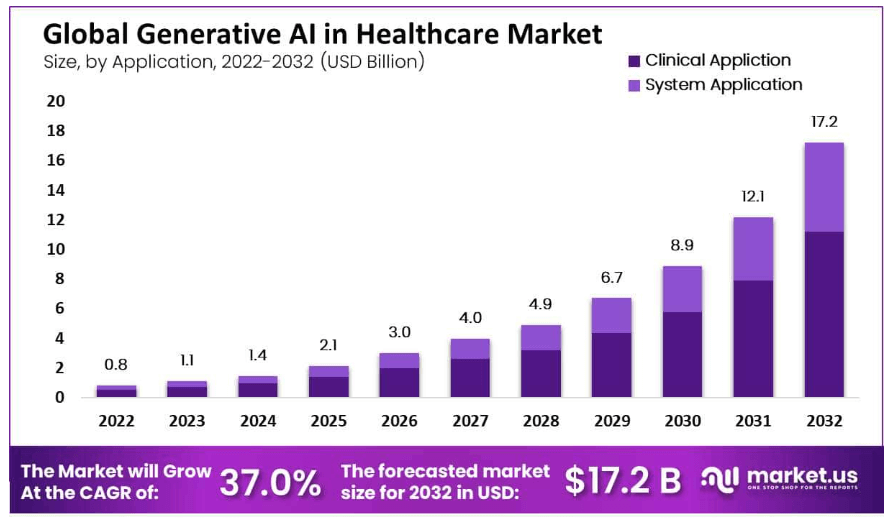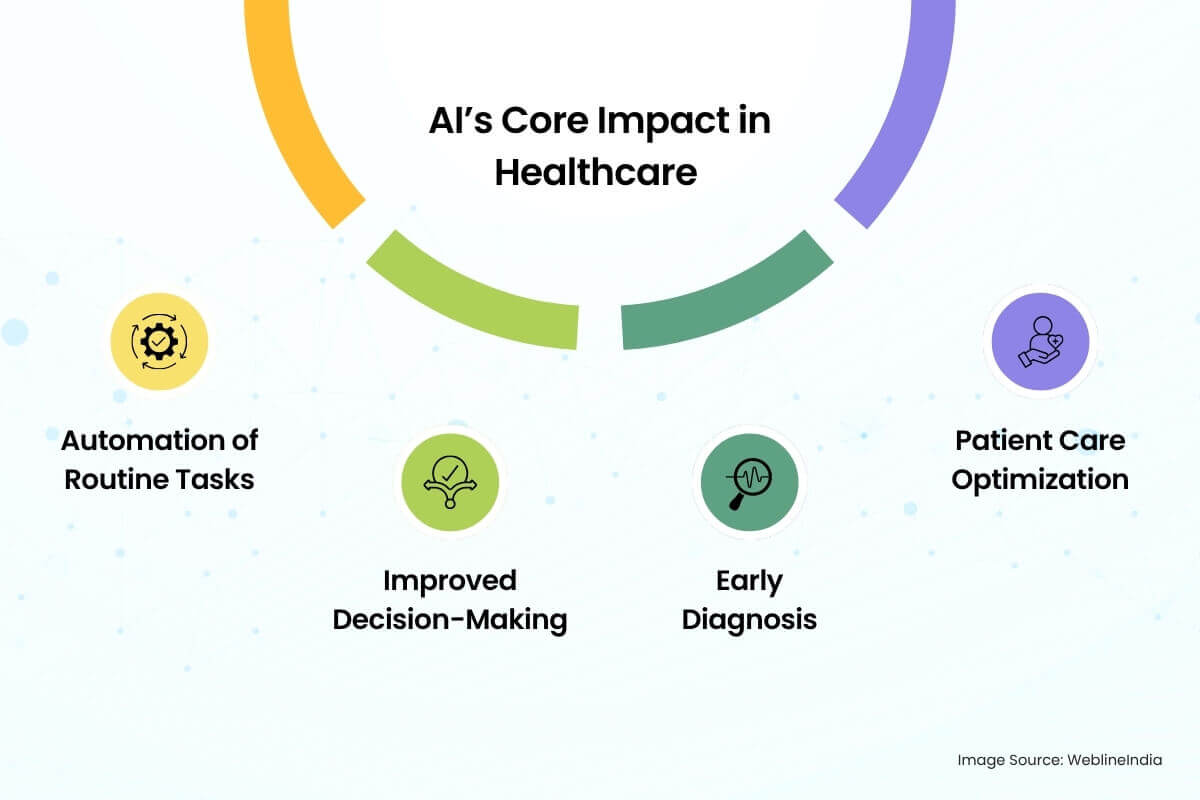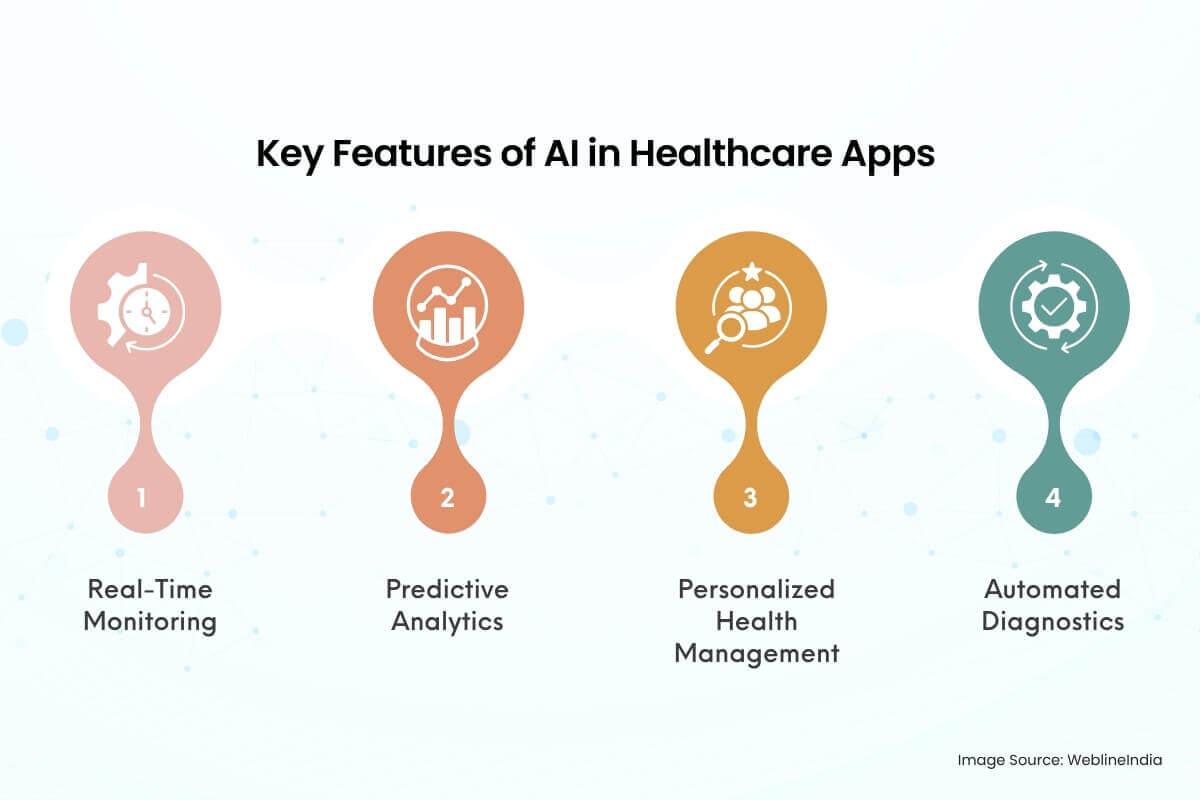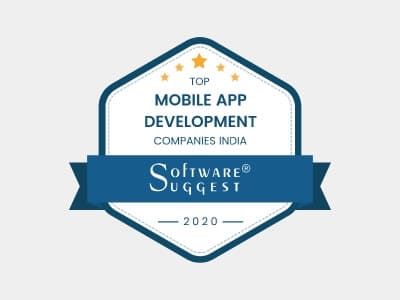Listen to the podcast :
The healthcare industry has always been a hub for technological innovations. From the invention of X-rays to the introduction of robotic surgeries, medical advancements have continuously enhanced the quality of patient care. However, in recent years, AI in healthcare has taken this evolution to unprecedented heights.
As reported by Market.us, the Global Generative AI in Healthcare Market reached a valuation of USD 0.8 billion in 2022 and is projected to grow significantly, reaching USD 17.2 billion by 2032. This market is anticipated to achieve a compound annual growth rate (CAGR) of 37% from 2023 to 2032.
Key factors fuelling this expansion include the increasing volume of digital health data, the rising demand for personalized medicine, and escalating healthcare expenses. While AI in app development is becoming quite common, AI is playing a pivotal role in modernizing the way healthcare services are delivered, accessed, and experienced.

In this blog, we’ll explore how AI is transforming the healthcare industry, especially through mobile and web applications, and how WeblineIndia helps integrate these powerful technologies into healthcare platforms.
Want to integrate AI into your healthcare app? Get a free consultation today!
The Growing Role of AI in Healthcare
The application of AI in healthcare is not just a trend but a revolution in how healthcare providers interact with their patients, how diagnoses are made, and how treatments are administered. AI is enabling doctors, nurses, and healthcare professionals to deliver more accurate, faster, and more efficient care. Machine learning (ML), deep learning (DL), natural language processing (NLP), and other AI technologies have already begun making a massive impact on the healthcare industry.
Under the title ‘Artificial intelligence in healthcare: transforming the practice of medicine’, Future Healthcare Journal. 2021 Jul;8(2):e188–e194 quotes:
Artificial intelligence (AI) is a powerful and transformative force within computer science, poised to revolutionize the practice of medicine and the delivery of healthcare. This review article explores recent breakthroughs in AI applications within the healthcare sector, outlines a framework for building effective, reliable, and safe AI systems, and discusses the potential future direction of AI-augmented healthcare systems.
AI’s Core Impact in Healthcare

- Automation of Routine Tasks: AI-powered systems can handle tasks such as scheduling appointments, processing billing, and updating patient records, allowing healthcare professionals to spend more time with their patients.
- Improved Decision-Making: AI systems analyze vast amounts of patient data to suggest treatment plans, highlight risks, and forecast future health problems.
- Early Diagnosis: AI algorithms can identify early warning signs of diseases like cancer, heart conditions, and diabetes, often before symptoms are noticeable to humans.
- Patient Care Optimization: AI systems track a patient’s medical history and current symptoms, recommending the most effective treatments tailored to the patient’s unique needs.
As AI continues to evolve, its potential in healthcare apps will only expand, offering more sophisticated, customized, and predictive features that benefit both patients and healthcare providers.
AI in App Development: Paving the Way for Smart Healthcare Solutions
AI’s capabilities have brought significant advancements to app development, especially in the healthcare sector. Today, developers integrate AI algorithms to create AI-powered mobile apps that allow users to monitor their health, access medical information and connect with healthcare professionals remotely. These applications use real-time data to provide personalized care and more accurate insights.
Key Features of AI in Healthcare Apps

- Real-Time Monitoring: Apps integrated with AI collect data from wearables, sensors, and other devices to monitor patients’ vitals in real-time. These data points are then analyzed, and any anomalies can trigger automatic alerts.
- Predictive Analytics: AI-driven apps can predict potential health risks such as heart attacks or diabetic episodes based on historical data and present indicators.
- Personalized Health Management: AI algorithms tailor health recommendations based on individual needs, including personalized workout plans, diet suggestions, and treatment schedules.
- Automated Diagnostics: Mobile healthcare apps that integrate AI are equipped with diagnostic tools that analyze symptoms or medical data and suggest potential diagnoses.
Ready to build a smarter healthcare app with AI? Let’s discuss your project!
Examples of AI-Powered Healthcare Apps
1. IBM Watson for Oncology
- Leverages cognitive computing to analyze vast amounts of medical literature and patient data.
- Assists oncologists in creating personalized treatment plans tailored to individual patients’ needs.
2. Google’s DeepMind
- Focuses on developing AI solutions for complex medical challenges.
- One notable project predicts acute kidney injury by analyzing patient data, enabling early intervention and improved patient outcomes.
3. PathAI
- Employs AI to enhance pathology diagnostics, improving the accuracy of disease identification in biopsy samples.
- This can lead to earlier and more effective treatment decisions.
4. Zebra Medical Vision
- Specializes in radiology, utilizing AI to analyze medical images such as X-rays, CT scans, and MRIs.
- Algorithms can detect abnormalities and provide insights into conditions like cardiovascular disease and liver diseases.
5. DreaMed Diabetes
- Focuses on personalized diabetes management.
- AI algorithms analyze patient data to tailor insulin management plans, optimizing blood sugar control and improving patient outcomes.
6. IDx-DR
- Utilizes AI to detect diabetic retinopathy by analyzing retinal images.
- Provides a rapid and accurate screening process, enabling early detection and prevention of vision loss.
7. Tempus
- Employs AI to analyze clinical and molecular data, aiding oncologists in making informed decisions for personalized cancer treatment.
- Provides valuable insights into patient-specific factors that can influence treatment outcomes.
8. Butterfly Network
- Integrates AI into handheld ultrasound devices.
- AI enhances image interpretation, assisting healthcare providers in making quicker diagnostic decisions.
9. Ada Health
- An AI-powered symptom checker and triage app.
- Evaluates user-reported symptoms and provides personalized health information, guiding users on whether to seek medical attention.
10. Buoy Health
- An AI-powered virtual health assistant.
- Assists users in understanding their symptoms, offers personalized advice, and helps navigate the healthcare system.
Revolutionizing Healthcare: The Role of Artificial Intelligence in Clinical Practice
BMC Medical Education volume 23, Article number: 689 (2023) quotes:
The integration of AI within healthcare offers significant potential to enhance disease diagnosis, treatment selection, and clinical laboratory testing. AI tools can leverage extensive datasets and identify patterns that surpass human capabilities in various healthcare domains.
With the help of AI, the healthcare sector can achieve increased accuracy, reduced costs, and time savings while minimizing human error. This technology has the potential to revolutionize personalized medicine, optimize medication dosages, and enhance population health management.
Artificial Intelligence in healthcare also helps us establish evidence-based guidelines and provide virtual health assistants while supporting mental health care improving patient education, and ensuring stronger patient-physician trust.
AI in Telemedicine: A Gateway to Remote Healthcare
AI in telemedicine is one of the most impactful innovations in healthcare, especially in a world that increasingly demands remote access to healthcare services. Telemedicine platforms powered by AI can offer consultations, prescriptions, and medical advice without requiring patients to visit a healthcare facility physically.
How AI Improves Telemedicine Platforms
- Virtual Health Assistants: AI-powered chatbots and virtual assistants are available 24/7, answering patient queries, helping them schedule appointments, and even providing basic diagnostics based on symptom input.
- AI-Driven Video Consultations: During video consultations, AI can analyze the patient’s facial expressions, voice tone, and gestures to provide a more comprehensive diagnosis and suggest the right course of action.
- Automatic Documentation: AI-powered transcription services automatically document conversations during telemedicine sessions, reducing manual effort and ensuring accurate patient records.
Advantages of AI in Telemedicine
- Wider Access to Healthcare: AI-powered telemedicine platforms can connect patients in remote areas with top-tier doctors without the need to travel long distances.
- Reduced Wait Times: AI systems can pre-screen patients based on symptoms or medical history, ensuring that healthcare providers only focus on cases that require immediate attention.
- Improved Diagnostics: AI can analyze patient data and suggest more accurate diagnoses during remote consultations, ensuring that healthcare providers deliver high-quality care even from a distance.
AI in Medical Sciences: Accelerating Research and Discovery
AI in medical sciences has led to significant breakthroughs in drug development, disease research, and genomics. Machine learning and deep learning algorithms are revolutionizing how medical research is conducted, identifying patterns and predicting outcomes that were previously impossible to discover in such a short time frame.
AI Applications in Medical Research
- Drug Discovery: AI accelerates the drug discovery process by analyzing vast datasets of chemical compounds, predicting how they will interact with diseases, and identifying promising candidates for treatment.
- Genomic Research: AI plays a crucial role in analyzing genetic data, identifying mutations linked to specific diseases, and developing personalized treatments based on an individual’s genetic makeup.
- Clinical Trials: AI models optimize clinical trial designs, patient recruitment, and monitoring, ensuring that trials are conducted more efficiently, with better results.
How AI Enhances Healthcare Research
- Speeding Up Discoveries: AI can analyze decades of clinical data in seconds, identifying patterns that lead to faster research outcomes.
- Increased Precision: AI systems improve the accuracy of studies by eliminating human biases, allowing researchers to rely on more precise data.
- Predictive Models: AI creates predictive models that simulate how diseases will behave in the human body, which can help develop effective therapies faster.
AI in Healthcare and Wellness Industry: Empowering Preventative Care
The AI in healthcare and wellness industry is transforming how individuals manage their health and wellness. By utilizing data collected from wearable devices, fitness trackers, and other health monitoring tools, AI-powered apps provide personalized advice and predictions about potential health issues. This empowers individuals to take proactive steps in managing their health, reducing the risk of chronic diseases, and leading healthier lives.
How AI Contributes to Wellness and Preventative Care
- Health Monitoring: AI-driven wearables like fitness bands, smartwatches, and health apps track metrics such as heart rate, sleep patterns, steps taken, and calories burned, providing users with actionable insights.
- AI Fitness Coaches: These apps use machine learning to create personalized fitness routines and dietary suggestions, adapting to users’ progress and goals.
- Mental Health: AI is also being used in mental health apps to detect patterns of stress, anxiety, or depression through analysis of behavioral data, helping users access support when needed.
Popular AI Wellness Apps
- Fitbit: Known for integrating AI with fitness tracking devices, Fitbit not only tracks physical activity but also provides recommendations to improve users’ sleep and overall wellness.
- Headspace: A mental wellness app that uses AI to personalize mindfulness exercises based on the user’s preferences and stress levels.
AI in Healthcare Research: Revolutionizing Medical Discoveries
AI in healthcare research is changing how scientists conduct studies, analyze data, and make discoveries. With its ability to process vast amounts of medical data, AI is enabling faster and more accurate research results. Researchers can now simulate clinical trials, predict patient outcomes, and analyze medical records in once unthinkable ways.
How AI Supports Healthcare Research
- Data Mining: AI can extract valuable insights from massive datasets, identifying correlations and patterns that can lead to new treatments or interventions.
- Clinical Decision Support Systems (CDSS): These AI systems analyze patient data and provide recommendations for the best course of treatment, aiding in faster decision-making and reducing the risk of errors.
- Predictive Modeling: AI is helping researchers build models that predict the progression of diseases or forecast the effectiveness of specific treatments, streamlining the development of medical therapies.
WeblineIndia’s Role in AI-Driven Healthcare App Development
At WeblineIndia, we are committed to helping businesses unlock the full potential of AI in healthcare. Our expertise in AI in app development enables us to create cutting-edge healthcare applications that not only improve patient care but also streamline operations for healthcare providers.
WeblineIndia’s team is proficient in incorporating the latest AI technologies such as machine learning, natural language processing, and predictive analytics into mobile and web applications to provide real-time insights, improve diagnoses, and optimize patient outcomes.
How WeblineIndia Enhances Healthcare Apps with AI
- AI Integration for Smart Healthcare Solutions: We help healthcare providers integrate AI-driven features into their apps to enable smarter, more efficient healthcare delivery.
- Data-Driven Decision Making: Our AI-powered apps enable healthcare professionals to make better, data-driven decisions by offering predictive analytics and real-time patient data analysis.
- Telemedicine with AI: We build telemedicine apps with AI capabilities, such as virtual health assistants, symptom checkers, and automated diagnostics to facilitate remote healthcare access.
- Custom AI Features: Whether it’s AI-powered chatbots, personalized fitness plans, or AI-driven clinical decision support systems, WeblineIndia integrates custom AI solutions that meet your specific business needs.
Conclusion
AI is undeniably transforming the healthcare sector, making medical processes smarter, more efficient, and more accessible. AI in healthcare apps and AI in app development are bringing about significant improvements in diagnostics, treatment, and patient care. WeblineIndia stands at the forefront of this transformation, offering tailored AI-powered solutions for healthcare providers and businesses.
Get a free quote for healthcare app development whether you’re looking to integrate AI into your mobile app or build a website with AI capabilities. WeblineIndia provides expertise and innovative solutions to enhance your digital products and deliver cutting-edge healthcare services.
Social Hashtags
#AIHealthcare #HealthTech #AIApps #DigitalHealth #SmartHealthcare #HealthcareInnovation #PatientCare #AIinHealthcare #WeblineIndia
Looking for AI-driven healthcare solutions? Let’s make your idea a reality!
Frequently Asked Questions
Testimonials: Hear It Straight From Our Global Clients
Our development processes delivers dynamic solutions to tackle business challenges, optimize costs, and drive digital transformation. Expert-backed solutions enhance client retention and online presence, with proven success stories highlighting real-world problem-solving through innovative applications. Our esteemed Worldwide clients just experienced it.
Awards and Recognitions
While delighted clients are our greatest motivation, industry recognition holds significant value. WeblineIndia has consistently led in technology, with awards and accolades reaffirming our excellence.

OA500 Global Outsourcing Firms 2025, by Outsource Accelerator

Top Software Development Company, by GoodFirms

BEST FINTECH PRODUCT SOLUTION COMPANY - 2022, by GESIA

Awarded as - TOP APP DEVELOPMENT COMPANY IN INDIA of the YEAR 2020, by SoftwareSuggest